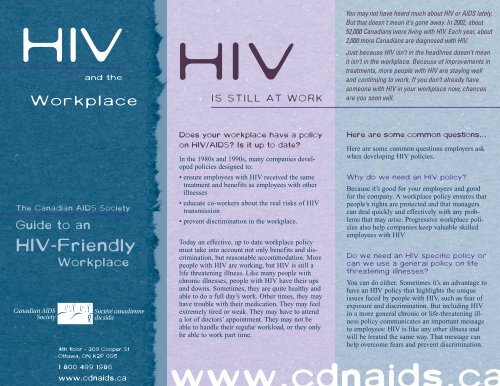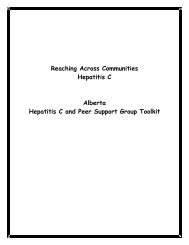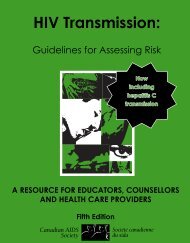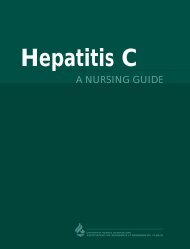HIV workplace brochure.qxd - CATIE
HIV workplace brochure.qxd - CATIE
HIV workplace brochure.qxd - CATIE
Create successful ePaper yourself
Turn your PDF publications into a flip-book with our unique Google optimized e-Paper software.
<strong>HIV</strong>and the<br />
Workplace<br />
<strong>HIV</strong><br />
IS STILL AT WORK<br />
You may not have heard much about <strong>HIV</strong> or AIDS lately.<br />
But that doesn't mean it's gone away. In 2002, about<br />
52,000 Canadians were living with <strong>HIV</strong>. Each year, about<br />
2,000 more Canadians are diagnosed with <strong>HIV</strong>.<br />
Just because <strong>HIV</strong> isn’t in the headlines doesn’t mean<br />
it isn’t in the <strong>workplace</strong>. Because of improvements in<br />
treatments, more people with <strong>HIV</strong> are staying well<br />
and continuing to work. If you don’t already have<br />
someone with <strong>HIV</strong> in your <strong>workplace</strong> now, chances<br />
are you soon will.<br />
The Canadian AIDS Society<br />
Guide to an<br />
<strong>HIV</strong>-Friendly<br />
Workplace<br />
4th floor - 309 Cooper St<br />
Ottawa, ON K2P 0G5<br />
1 800 499 1986<br />
www.cdnaids.ca<br />
Does your <strong>workplace</strong> have a policy<br />
on <strong>HIV</strong>/AIDS Is it up to date<br />
In the 1980s and 1990s, many companies developed<br />
policies designed to:<br />
• ensure employees with <strong>HIV</strong> received the same<br />
treatment and benefits as employees with other<br />
illnesses<br />
• educate co-workers about the real risks of <strong>HIV</strong><br />
transmission<br />
• prevent discrimination in the <strong>workplace</strong>.<br />
Today an effective, up to date <strong>workplace</strong> policy<br />
must take into account not only benefits and discrimination,<br />
but reasonable accommodation. More<br />
people with <strong>HIV</strong> are working, but <strong>HIV</strong> is still a<br />
life threatening illness. Like many people with<br />
chronic illnesses, people with <strong>HIV</strong> have their ups<br />
and downs. Sometimes, they are quite healthy and<br />
able to do a full day’s work. Other times, they may<br />
have trouble with their medication. They may feel<br />
extremely tired or weak. They may have to attend<br />
a lot of doctors’ appointment. They may not be<br />
able to handle their regular workload, or they only<br />
be able to work part time.<br />
Here are some common questions...<br />
Here are some common questions employers ask<br />
when developing <strong>HIV</strong> policies.<br />
Why do we need an <strong>HIV</strong> policy<br />
Because it’s good for your employees and good<br />
for the company. A <strong>workplace</strong> policy ensures that<br />
people’s rights are protected and that managers<br />
can deal quickly and effectively with any problems<br />
that may arise. Progressive <strong>workplace</strong> policies<br />
also help companies keep valuable skilled<br />
employees with <strong>HIV</strong><br />
Do we need an <strong>HIV</strong> specific policy or<br />
can we use a general policy on life<br />
threatening illnesses<br />
You can do either. Sometimes it’s an advantage to<br />
have an <strong>HIV</strong> policy that highlights the unique<br />
issues faced by people with <strong>HIV</strong>, such as fear of<br />
exposure and discrimination. But including <strong>HIV</strong><br />
in a more general chronic or life-threatening illness<br />
policy communicates an important message<br />
to employees: <strong>HIV</strong> is like any other illness and<br />
will be treated the same way. That message can<br />
help overcome fears and prevent discrimination.
What should the policy cover<br />
An effective policy should cover the following<br />
issues:<br />
• the employee’s right to work as long as health<br />
allows and right to job accommodation<br />
• the employee’s right to confidentiality<br />
• the employee’s eligibility for benefits<br />
• reference to relative legislation<br />
• the manager’s/supervisor’s responsibilities<br />
• the employee’s responsibilities<br />
• co-worker’s responsibilities, and how the company<br />
will deal any co-worker issues (e.g.,<br />
refusal to work with someone with <strong>HIV</strong>)<br />
• the company’s responsibility for educating<br />
employees about <strong>HIV</strong> and the risks of transmission<br />
• the steps the company will take to provide a<br />
supportive environment for people with <strong>HIV</strong><br />
or other chronic/life threatening illnesses<br />
What legislation does the policy<br />
have to comply with<br />
The policy must comply with the Canadian<br />
Charter of Human Rights, and with any other<br />
provincial legislation governing human rights,<br />
disabilities, and <strong>workplace</strong> standards. Under the<br />
Canadian Charter of Human Rights, <strong>HIV</strong> is<br />
classified as a disability, so people with <strong>HIV</strong><br />
have the same rights as anyone with a disability.<br />
What are “reasonable accommodations”<br />
for people with <strong>HIV</strong><br />
Reasonable accommodations can include:<br />
• flexible work schedules<br />
• time off to attend doctors’ appointments<br />
• generous leave policies<br />
• the opportunity to shift from full to part time<br />
work, and back again<br />
• reassignment to a less physically demanding position.<br />
People with <strong>HIV</strong> are often on very strict, demanding<br />
drug regimens. It’s important that they take<br />
their medications at certain times every day, and<br />
the <strong>workplace</strong> should be able to accommodate that.<br />
For more information on appropriate accommodations,<br />
contact the Canadian Council on<br />
Rehabilitation and Work Job Accommodation<br />
Services (http://www.ccrw.org/en/jas.htm).<br />
Should an employer or supervisor<br />
tell employees when a co-worker<br />
has <strong>HIV</strong><br />
No. You are required by law to keep employees’<br />
medical information confidential. As a supervisor,<br />
you may need to know when an employee has<br />
<strong>HIV</strong> – because the employee may need time off to<br />
attend appointments or some accommodation to<br />
be able to continue doing his or her job. But other<br />
co-workers do not need to know. Leave the decision<br />
about telling others to the person with <strong>HIV</strong>.<br />
Most people know about <strong>HIV</strong>.<br />
Is employee education still necessary<br />
It’s true that most Canadians do know the facts about<br />
<strong>HIV</strong>. But some people still have unreasonable fears<br />
about contracting <strong>HIV</strong> or negative attitudes towards<br />
people who are infected. Education helps. One of the<br />
most effective ways to educate employees about <strong>HIV</strong><br />
is to incorporate it into a presentation on your <strong>HIV</strong> or<br />
life-threatening illnesses policy or into other training<br />
on the rights of people with disabilities or <strong>workplace</strong><br />
health and safety.<br />
If an employee discloses to co-workers that he or she has<br />
<strong>HIV</strong> and employees react inappropriately, you may have<br />
to offer some special education and/or take other steps (as<br />
set out in your policy) to protect the ill employee’s rights<br />
and create a supportive work environment.<br />
What do employees need to know<br />
They should know:<br />
• what <strong>HIV</strong> infection and AIDS are<br />
• how the virus is transmitted<br />
• the actual risks in the <strong>workplace</strong><br />
• how <strong>HIV</strong> affects people who are infected<br />
• the rights of people who are infected<br />
• the company’s policy<br />
• what they can do to help co-workers who are<br />
infected (e.g., be understanding and supportive).<br />
Because anyone can get <strong>HIV</strong>, it may also help to<br />
give employees access to general information so<br />
they can assess their own risk and decide whether<br />
they should be tested.<br />
graphic design: Marida Waters / MW Design<br />
<strong>HIV</strong> IS STILL AT WORK<br />
And So Are We.<br />
This pamphlet was created with financial support from:<br />
Abbott Laboratories, Limited;<br />
Bristol-Myers Squibb Virology –<br />
Bristol-Myers Squibb Pharmaceutical Group;<br />
Merck Frosst Canada & Co.<br />
The Canadian AIDS Society (CAS) has been<br />
working since 1986 to help prevent the spread<br />
of <strong>HIV</strong>, to prevent discrimination, and to support<br />
people who are infected. CAS is a network of<br />
community-based <strong>HIV</strong>/AIDS organizations<br />
across the country. If you need help to develop<br />
an <strong>HIV</strong> policy for your <strong>workplace</strong> or to revise<br />
your life threatening illnesses policy to include<br />
<strong>HIV</strong>, please call us or check out the <strong>HIV</strong> and the<br />
Workplace information on our web site.

















